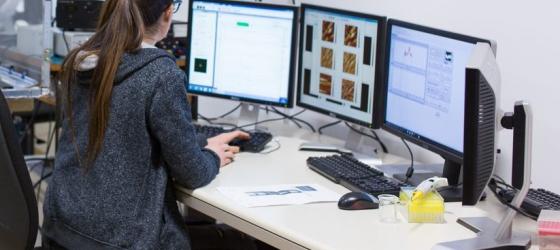All digital resources are accessible from all locations on the University network; to access content from external locations, you must set up a proxy on your device.
Multidisciplinary resources
Web of Science (Clarivate Analytics): citation database including access to Journal citation reports, (with access to journal IFs) and EndNote web (subject to individual registration)
Scopus (Elsevier): citation database, access to CiteScore and h-index metrics
Proquest central Multidisciplinary database
Dimensions: citation database in open access without restriction. Adopts Altmetric metrics
Ubidctionary dictionaries all Zanichelli bilingual dictionaries (EN FR DE ES RU ZH)
E-journals (type in the journal title of interest)
The editorial packages of journals: Elsevier, Springer, Wiley, Cambridge Core, Oxford, Karger, IOP (Institute of physics), SPIE,Bentley
Springer Materials
The Springer Materials database based on the Landolt-Börnstein series also includes the following resources:
- MSI Database: Critically evaluated phase diagrams reports of binary and ternary metal systems.
- Linus Pauling Files: Structural data, phase diagram and physical properties of inorganic solid phase materials.
- Advanced Thermal Analysis System: Thermodynamic properties of polymers.
- Dortmund Databank Separation Technology: Thermophysical properties of organic single components and binary mixtures.
- Adsorption Isotherm Database: Gas adsorption data for various gases and adsorbents.
- Corrosion Database: Corrosion rate data for metals and alloys also covering exposure conditions and environment.
CSD The Cambridge Structural Database
CSD The Cambridge Structural Database is the most extensive data resource covering the organic and metallo-organic crystal structure of small molecules, published by the Cambridge Crystallographic Data Centre (CCDC), a non-profit organisation based in the UK. The CSD web database and related software are a vital working tool in fields spanning crystallography, chemistry, pharmaceutical sciences and nanotechnology. see more info
MathSciNet
A bibliographical database dedicated to the scientific literature on mathematics of the AMS (American Mathematical Society), MathSciNet contains millions of bibliographical references and reviews and offers temporal coverage from 1800 onwards.
Reaxys
A chemistry database, Reaxys includes over 100 million organic, inorganic and metalloorganic chemical compounds, millions of reactions and published experimental data. In addition to the traditional directories (Beilstein and Gmelin), hundreds of specialised periodicals in organic, inorganic, metallorganic, physics, computational, materials science, petrochemistry, pharmacy and pharmacology are surveyed, plus others related to chemistry.
SciFinder
Bibliographic and factual database of chemical literature and scientific information produced by CAS (Chemical Abstract Service), SciFinder covers the subject areas of chemistry, biology, food science, medicine, geology, chemical engineering, materials science, physics. Updated daily. It is accessible, subject to creation of an account with a UniGe institutional e-mail address, from stations on the University network.
PubChem
Maintained by the NCBI (National Centre of Biotechnology Information) of the NLM (National Library of Medicine), PubChem is a free database of chemical molecules consisting of three free factual databases: PubChem Substance, PubChem Compound, PubChem Bioassay. PubChem Substance contains information on chemical substances, PubChem Compound describes the chemical properties of these compounds, and PubChem Bioassay includes bioactivity studies carried out by the Developmental Therapeutic Program (NCBI), each of which is linked to records in PubChem Substance. The three databases are linked to other NCBI databases such as PubMed, Protein and Structure. As with PubMed, to which PubChem is linked, to access any full text of publications or to use the article delivery service when connecting from external locations, you need to set up the Proxy on your device.
JoVE
A web platform that publishes in text and audiovisual format the latest scientific research and teaching news from leading international institutions, the Journal of Visualised Experiments is a tool for medical and scientific teaching. All videos, which can be viewed in HD on any device, can be easily shared between lecturers and students even via the main e-learning platforms. The resource comprises the two components ‘Research’ and ‘Education’: ‘’Research‘’ consists of the more than 10. 000 peer-reviewed video-articles published in the ‘’JoVE Video Journal‘’ - illustrating scientific research from research institutes all over the world - and the video-encyclopaedia ‘’JoVE Encyclopaedia of Experiments‘’; the ‘’Education‘’ part consists of teaching videos supporting undergraduate and postgraduate teaching - in e-learning mode - of scientific concepts and laboratory methods mainly aimed at the medical, psychological and behavioural sciences, and STEM (Science, Technology, Engineering and Mathematics) areas. It is accessible from all the University's networked workstations.
Through Uno per tutto it is possible to perform an integrated and simultaneous search within most of the subscription databases. The University's discovery tool complements the individual databases but does not replace them: some specific advanced bibliographic search functions are in fact only accessible on the search interfaces of the original resources. All subscription databases are searchable and accessible via Uno per tutto l from the menu: Find Databases. Access to the contents, as well as from workstations within the UniGe network, is normally allowed from external workstations via Proxy. Any particularities in the access modes are indicated in the description of the resource.
